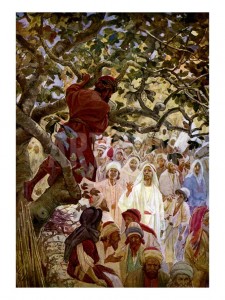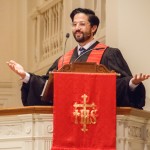Luke 19:1-10
This text is used for the Lectionary Year C on October 30th, 2016.
 One of the most well-known stories of the New Testament, with accompanying soundtrack and all, is that of the rich tax collector, Zacchaeus. This makes the preacher’s task of finding something “new” much more difficult than at other times. Flipping or swiping back a few pages might offer some inspiration.
One of the most well-known stories of the New Testament, with accompanying soundtrack and all, is that of the rich tax collector, Zacchaeus. This makes the preacher’s task of finding something “new” much more difficult than at other times. Flipping or swiping back a few pages might offer some inspiration.
In chapter 18, immediately preceding the Gospel reading for this week, the reader will find two stories that further illustrate what Luke is offering the audience. The reference to a rich (young) ruler, who obeys all the commandments but can’t part with his wealth, presumably failing the first and greatest commandment. Compare this to the story of the Pharisee and the tax collector and the prayers they offer before God. Both are presumed to be wealthy, but only one is rich in spirit.
Swipe back a couple more pages to chapter 16, where we read of a rich man and his shrewd manager, followed by the important interpretive lens, “You cannot serve both God and money (mammon).” This transitions into another story some may have preached a few weeks earlier—that of the rich man and Lazarus on his front stoop.
Back to Zacchaeus, it’s not that hard to substitute Zacchaeus into any of these stories. Perhaps this can add context for the preacher and the hearer as they travel Luke 19 together. Reminding people of why the community reviled tax collectors is one step, but so too, is recognizing the love of money as the real offense to God.
In this section of Luke’s Gospel, the stories start to surprise the hearer, reversing the expectations, and landing with more shock and impact because of it. How can the preacher communicate this reversal of expectations again, with such a familiar story?
Many will remember or catch on that Zacchaeus wasn’t liked. What’s a contemporary comparison? It might not be that hard to dream up a rich man who exploits or stiffs his contractors, who bullies and intimidates with his power and privilege—and this wouldn’t be far off. But for our first-world, American culture, that example lets many of the hearers off the hook.
Many will choose to identify with the crowd surrounding Jesus, while the 1% climbs higher on their backs. Others will choose to see themselves in terms of the post-reformed Zacchaeus, saved by the grace of God. But in many ways—tread pastorally, friends—the real shock and reversal of expectations for the audience, is that many of them are more like the pre-reformed Zacchaeus than they care to admit or even recognize.
Certainly, not all, but many American church contexts are comprised of well-enough-to-do’s who own their own cars or trucks or houses, with two-and-a-half Honor Roll children, and maybe even the seeds of a 401k. At some point, it would be pastoral to remind the congregation that wealth on its own is no vice.
But how many of us know how ethically our food is sourced, or if the factory workers overseas receive a living wage or any sort of benefits that signify their dignity as bearers of God’s image? How many of us know the kind of impact our consumerism has on those who produce our phones, tablets, computers, name-brand clothing, food, hymnals, Sunday Morning coffee hour, paper for our Sunday bulletins, weekly newsletters…? We might not be stealing money from people like Zacchaeus did, but by our blind complicity in systems of consumerism, we rob many people of their inherent dignity and worth. The preacher has an opportunity to educate and pastor her congregation by highlighting ways our culture values mammon over humans.
Zacchaeus wasn’t liked, even as he strived to climb the ladders of success and status by accumulating wealth. But it was the humility (humiliation) of climbing a tree that began his journey to salvation. Zacchaeus embodied what the characters in Luke’s previous stories couldn’t: the rich man who won’t help Lazarus, the manager who tries to serve both God and money, the rich (young) ruler who can’t give away all his possessions. Zacchaeus changes and his actions portray it: he serves God, not money, precisely because he values humans over mammon. It may not be that God wants our congregants to give away all their possessions, but how can the preacher guide them toward the lifting up of those lives that are so often burdened and put down?
One last thought for the preacher to remember is the lens through which Luke wants us to interpret Jesus’ ministry—Luke 4.
“The Spirit of the Lord is upon me…to liberate the oppressed…”
Jesus’ ministry of liberation for the oppressed is so radically inclusive that even those who are oppressing others can be liberated. And that is the hopeful Good News for many in our congregations today.
What was a scandal for the crowd—a rich man changing—was salvation for Zacchaeus. That same scandal is our salvation today.
 Brent A. Newberry
Brent A. Newberry
Pastor
The First Baptist Church of Worcester, Massachusetts
Brentn@fbc-worc.org
Tags: salvation, liberation, tax collector, money, zacchaeus
